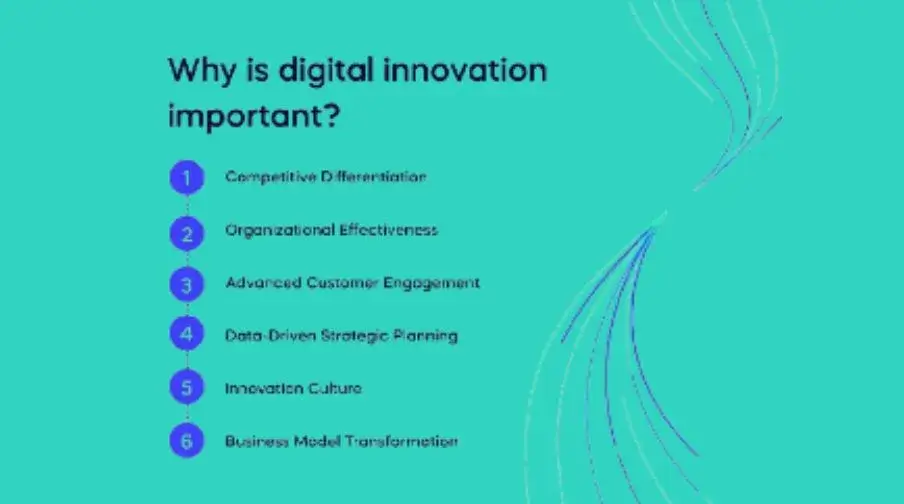Digital innovation refers to using digital technology to create new value in business models, customer experiences, and the internal capabilities that support core operations. But, this can include anything from developing new digital products to transforming existing processes with cutting-edge technology.
It is important to get digital innovation to drive success. So, it transforms industries, creating new opportunities. Adopting it can lead to unprecedented growth. Digital innovation involves technology to create new or improved processes, products, and services. It’s essential for staying competitive in the digital age. So, this blog explores what digital innovation is, its importance, benefits, and future.
Importance of Digital Innovation
Digital innovation is crucial for businesses to remain competitive. It enables organizations to improve efficiency, reduce costs, and create better products and services. In a rapidly changing market, staying ahead requires continuous innovation and adaptation to new technologies. So, it is important to know about the major things to consider for digital innovation. It helps to make the digital world most effective. So, all major important points are discussed here:

- Competitive Settings
Digital innovation is crucial for competitive systems in the market. Businesses that improve technology can adapt quickly to changes, outperform their competitors, and meet evolving customer demands. So, check the digital system and make it effective for all fields of the world.
- Enhancing Efficiency
It is also good to know that the best thing about digital innovation is to enhance efficiency. With the innovation and digital system you can improve your things working in the system. Overall, efficiency improvement comes from digital innovation.
- Improving Customer Experience
Innovative digital solutions, such as personalized marketing and responsive customer service, enhance customer satisfaction. To understand and anticipate customer needs, businesses can build stronger relationships and loyalty. So, it is overall, good to improve customer experience. Moreover, work is also quite easy to adopt and makes your daily life work easy.
- New Revenue Streams Creation
Technology is necessary in all fields. But, it is good to work with Digital innovation opens up new opportunities for revenue generation. Whether through the development of new products, services, or business models, companies can diversify their income sources and increase profitability.
- Driving Growth and Scalability
By implementing digital solutions, businesses can scale their operations more effectively. Automation and data analytics enable informed decision-making, driving sustainable growth and long-term success.
Benefits Of Digital Innovation
There are numerous benefits of digital innovation. It can lead to enhanced customer experiences, increased operational efficiency, and the creation of new revenue streams. Additionally, it can help businesses respond more quickly to market changes and customer demands.
1. Increased Efficiency
Digital innovation streamlines business processes, automates routine tasks, and reduces manual errors. This leads to faster operations, better resource management, and significant cost savings, allowing businesses to achieve more with less effort.
2. Enhanced Customer Experience
Innovative digital tools enable personalized customer interactions and support. From chatbots to data-driven marketing, businesses can understand and meet customer needs more effectively, leading to higher satisfaction and loyalty.
3. New Revenue Opportunities
Digital innovation opens up new markets and revenue streams. Companies can develop new products, offer digital services, or adopt new business models, diversifying their income and driving growth.
4. Improved Decision-Making
Access to real-time data and advanced analytics helps businesses make informed decisions. By analyzing customer behavior, market trends, and operational performance, companies can optimize strategies and respond swiftly to changes.
Areas To Use Digital Innovation
Digital innovation can be applied across various areas, including healthcare, finance, manufacturing, and retail. In healthcare, for example, it can improve patient care through telemedicine and electronic health records. In finance, digital innovation can enhance security and streamline transactions.
1. Healthcare
Digital healthcare innovation improves patient care, enhances diagnostic accuracy, and streamlines administrative processes. Technologies like telemedicine, electronic health records (EHRs), and wearable health devices allow for remote monitoring and consultation, providing better access to healthcare services and reducing the burden on healthcare facilities.
2. Finance
In the finance sector, digital innovation enhances security, efficiency, and customer service. Online banking, mobile payment systems, and blockchain technology enable faster and more secure transactions. Artificial intelligence and machine learning are used for fraud detection, risk management, and personalized financial services.
3. Manufacturing
Digital innovation transforms manufacturing through automation, robotics, and the Internet of Things (IoT). Smart factories use connected devices and sensors to monitor and optimize production processes, reducing downtime and increasing efficiency. Additive manufacturing, such as 3D printing, allows for rapid prototyping and customization.
4. Retail
Retailers leverage digital innovation to enhance the shopping experience and streamline operations. E-commerce platforms, mobile apps, and digital payment systems provide customers with convenient shopping options. Data analytics and AI enable personalized marketing, inventory management, and customer service, improving overall satisfaction and loyalty.
5. Education
Digital innovation in education creates more engaging and accessible learning environments. Online learning platforms, virtual classrooms, and educational apps provide students with flexible learning options. Augmented reality (AR) and virtual reality (VR) offer immersive experiences that enhance understanding and retention of complex concepts.
6. Transportation
The transportation industry benefits from digital innovation through smart infrastructure, autonomous vehicles, and real-time data analytics. Connected transportation systems improve traffic management, reduce congestion, and enhance safety. Ride-sharing apps and on-demand transportation services provide convenient and efficient mobility solutions.
7. Agriculture
Digital innovation in agriculture increases productivity and sustainability. Precision farming uses IoT devices, drones, and data analytics to monitor crop health, optimize irrigation, and manage resources efficiently. These technologies help farmers make informed decisions, reduce waste, and improve yields.
8. Energy
The energy sector utilizes digital innovation to enhance efficiency and sustainability. Smart grids, renewable energy sources, and energy management systems optimize energy production, distribution, and consumption. Digital tools help monitor and reduce energy usage, contributing to environmental sustainability and cost savings.
9. Real Estate
In real estate, digital innovation streamlines property management and enhances the buying and renting experience. Online listing platforms, virtual tours, and digital contracts simplify transactions and improve accessibility. Smart home technologies add convenience and increase property value.
10. Entertainment
Digital innovation transforms the entertainment industry by enabling new ways to create, distribute, and consume content. Streaming services, virtual reality (VR), and augmented reality (AR) offer immersive experiences. Social media platforms and digital marketing strategies allow for greater audience engagement and monetization opportunities.
Future Of Digital Innovation
The future of digital innovation is promising, with advancements in artificial intelligence, blockchain, and the Internet of Things (IoT). So, these technologies will continue to transform industries, making processes more efficient and opening up new opportunities for growth and innovation.
The future of digital innovation is incredibly promising, with advancements in technology set to revolutionize various industries. Artificial intelligence (AI) will play a pivotal role, driving automation, enhancing decision-making processes, and creating more personalized customer experiences.
Businesses will leverage AI to analyze vast amounts of data, uncovering insights that were previously unattainable, leading to more informed and strategic decisions.
Another significant trend is the expansion of the Internet of Things (IoT), connecting everyday devices to the internet and each other. This interconnected network will enable smarter homes, cities, and industries, enhancing efficiency and convenience.
For example, IoT can optimize supply chain management by providing real-time tracking and monitoring, reducing delays and costs.
Blockchain technology will also shape the future of digital innovation, particularly in enhancing security and transparency. It has the potential to revolutionize sectors like finance, healthcare, and supply chain by providing secure, decentralized ledgers that reduce fraud and increase trust.
As these technologies continue to evolve, they will unlock new opportunities and transform how businesses operate and deliver value.
Examples of Digital Innovation
There are many examples of digital innovation. For instance, online banking has revolutionized the financial industry by providing customers with convenient access to their accounts. Another example is the use of AI in customer service, where chatbots handle inquiries and improve customer satisfaction. All Major example about digital innovation are:
- Online Banking
Online banking has revolutionized the financial industry by providing customers with 24/7 access to their accounts. Through mobile apps and secure websites, users can check balances, transfer funds, and pay bills conveniently, enhancing the customer experience and streamlining financial management.
- Telemedicine
Telemedicine uses digital technology to deliver healthcare services remotely. Patients can consult with doctors via video calls, access medical records online, and receive prescriptions digitally. This innovation improves healthcare accessibility, especially for those in remote or underserved areas.
- E-commerce Platforms
E-commerce platforms like Amazon and Alibaba have transformed retail by enabling businesses to sell products online. These platforms provide tools for inventory management, payment processing, and customer engagement, allowing businesses to reach a global audience and operate efficiently.
- Artificial Intelligence In Customer Service
AI-powered chatbots and virtual assistants are enhancing customer service across various industries. These tools can handle inquiries, resolve issues, and provide personalized recommendations 24/7, improving customer satisfaction and reducing the workload for human agents.
Challenges Of Digital Innovation
Despite its benefits, digital innovation also presents challenges. These can include cybersecurity threats, high implementation costs, and resistance to change within organizations. Overcoming these challenges requires strategic planning and a commitment to continuous improvement.
- Cybersecurity Threats
As businesses adopt digital technologies, they become more vulnerable to cyberattacks. Protecting sensitive data and maintaining robust cybersecurity measures is essential, but it can be challenging due to the evolving nature of cyber threats and the increasing complexity of IT systems.
- High Implementation Costs
Digital innovation often requires significant investment in new technologies, infrastructure, and training. The high upfront costs can be a barrier, especially for small and medium-sized enterprises (SMEs), making it challenging to adopt and integrate new digital solutions effectively.
- Resistance to Change
Organizations may face resistance from employees who are accustomed to traditional processes. Overcoming this resistance requires effective change management strategies, including communication, training, and support to help employees adapt to new technologies and workflows.
- Skills Gap
The rapid pace of digital innovation creates a demand for new skills that the existing workforce may not possess. Bridging the skills gap requires ongoing education and training initiatives, as well as efforts to attract and retain talent with expertise in emerging technologies.
Strategies For Implementing Digital Innovation
To successfully implement digital innovation, businesses should start by identifying their goals and assessing their current capabilities. They should then develop a clear strategy, invest in the right technologies, and foster a culture of innovation within the organization.
- Define Clear Goals and Objectives
Start by identifying specific goals and objectives for digital innovation. Understand what you want to achieve, whether it’s improving customer experience, increasing efficiency, or developing new revenue streams. Clear goals provide direction and help measure success.
- Assess Current Capabilities
Evaluate your organization’s current digital capabilities. Identify existing strengths and areas for improvement. This assessment helps in understanding the starting point and in planning the resources and changes needed for implementing digital innovation.
- Develop a Comprehensive Strategy
Create a detailed strategy that outlines the steps needed to achieve your digital innovation goals. This should include timelines, budgets, and key performance indicators (KPIs). A well-defined strategy ensures that all stakeholders are aligned and that resources are effectively allocated.
- Invest in the Right Technologies
Select and invest in technologies that align with your innovation goals. Consider factors such as scalability, integration with existing systems, and ease of use. Investing in the right technologies is crucial for successful implementation and long-term sustainability.
- Foster a Culture of Innovation
Encourage a culture that embraces change and innovation. Promote collaboration, experimentation, and learning within the organization. Provide training and development opportunities to equip employees with the skills needed for digital transformation.
Measuring The Impact Of Digital Innovation
Measuring the impact of digital innovation is essential for understanding its effectiveness and making necessary adjustments. Key performance indicators (KPIs) can include metrics such as customer satisfaction, operational efficiency, and revenue growth. Regularly reviewing these metrics helps businesses ensure they are achieving their innovation goals.
Conclusion
Digital innovation is a powerful driver of business success. It enables organizations to stay competitive, improve efficiency, and create new value. By understanding its importance, benefits, and challenges, businesses can develop effective strategies for implementing digital innovation and measuring its impact.
Digital innovation is essential for modern business success. It transforms industries, enhances efficiency, and opens new growth opportunities. By understanding and embracing digital innovation, businesses can thrive in a rapidly evolving digital landscape.
Frequently Asked Questions
1. What Is Digital Innovation?
Digital innovation involves using digital technology to create new or improved processes, products, and services.
2. Why Is Digital Innovation Important?
It is crucial for staying competitive, improving efficiency, and responding quickly to market changes.
3. What Are The Benefits Of Digital Innovation?
Benefits include enhanced customer experiences, increased operational efficiency, and new revenue streams.
4. In which Areas Can Digital Innovation Be Used?
It can be applied in healthcare, finance, manufacturing, retail, and many other industries.
5. What Is The Future Of Digital Innovation?
The future includes advancements in AI, blockchain, and IoT, which will continue to transform industries.
6. What Are The Challenges Of Digital Innovation?
Challenges include cyber security threats, high costs, and resistance to change.
7. How Can Businesses Implement Digital Innovation?
Businesses should identify their goals, develop a clear strategy, invest in technology, and foster a culture of innovation.





